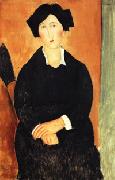Wholesale Oil Painting No Minimum |
|||||||||||
|
|
|||||||||||

|
|||||||||||
|
|
|
||||||||
Amedeo ModiglianiItalian Expressionist Painter and Sculptor, 1884-1920 Amedeo Clemente Modigliani (July 12, 1884 ?C January 24, 1920) was an Italian artist of Jewish heritage, practicing both painting and sculpture, who pursued his career for the most part in France. Modigliani was born in Livorno (historically referred to in English as Leghorn), in northwestern Italy and began his artistic studies in Italy before moving to Paris in 1906. Influenced by the artists in his circle of friends and associates, by a range of genres and art movements, and by primitive art, Modigliani's œuvre was nonetheless unique and idiosyncratic. He died in Paris of tubercular meningitis, exacerbated by poverty, overworking, and an excessive use of alcohol and narcotics, at the age of 35. |
||||||||
|
|
||||||||
The Italian Woman
The Italian Woman Painting ID:: 10629 |
1917, oil on canvas, 40 3/8 x 26 3/8 ins (102.6 x 67 cm). The Metropolitan Museum of Art, Gift of The Chester Dale Collection, 1956. 1917, oil on canvas, 40 3/8 x 26 3/8 ins (102.6 x 67 cm). The Metropolitan Museum of Art, Gift of The Chester Dale Collection, 1956. |
|||||||
|
|
||||||||
|
Vincent Van Gogh Dutch Post-Impressionist Painter, 1853-1890 Vincent Willem van Gogh (30 March 1853 ?C 29 July 1890) was a Dutch Post-Impressionist artist. Some of his paintings are now among the world's best known, most popular and expensive works of art. Van Gogh spent his early adult life working for a firm of art dealers. After a brief spell as a teacher, he became a missionary worker in a very poor mining region. He did not embark upon a career as an artist until 1880. Initially, Van Gogh worked only with sombre colours, until he encountered Impressionism and Neo-Impressionism in Paris. He incorporated their brighter colours and style of painting into a uniquely recognizable style, which was fully developed during the time he spent at Arles, France. He produced more than 2,000 works, including around 900 paintings and 1,100 drawings and sketches, during the last ten years of his life. Most of his best-known works were produced in the final two years of his life, during which time he cut off part of his left ear following a breakdown in his friendship with Paul Gauguin. After this he suffered recurrent bouts of mental illness, which led to his suicide. The central figure in Van Gogh's life was his brother Theo, who continually and selflessly provided financial support. Their lifelong friendship is documented in numerous letters they exchanged from August 1872 onwards. Van Gogh is a pioneer of what came to be known as Expressionism. He had an enormous influence on 20th century art, especially on the Fauves and German Expressionists. The Italian Woman 1887 2' 8'' x 1' 11 1/2''(81 x 60 cm)Gift of Baroness Eva Gebhardt-Gourgaud,1965 |
||||||||
|
|
||||||||
|
Prev Next
|
||||||||
|
|
||||||||
|
Related Paintings to Vincent Van Gogh :. |
||||||||
|
|
||||||||
|
CONTACT US |

